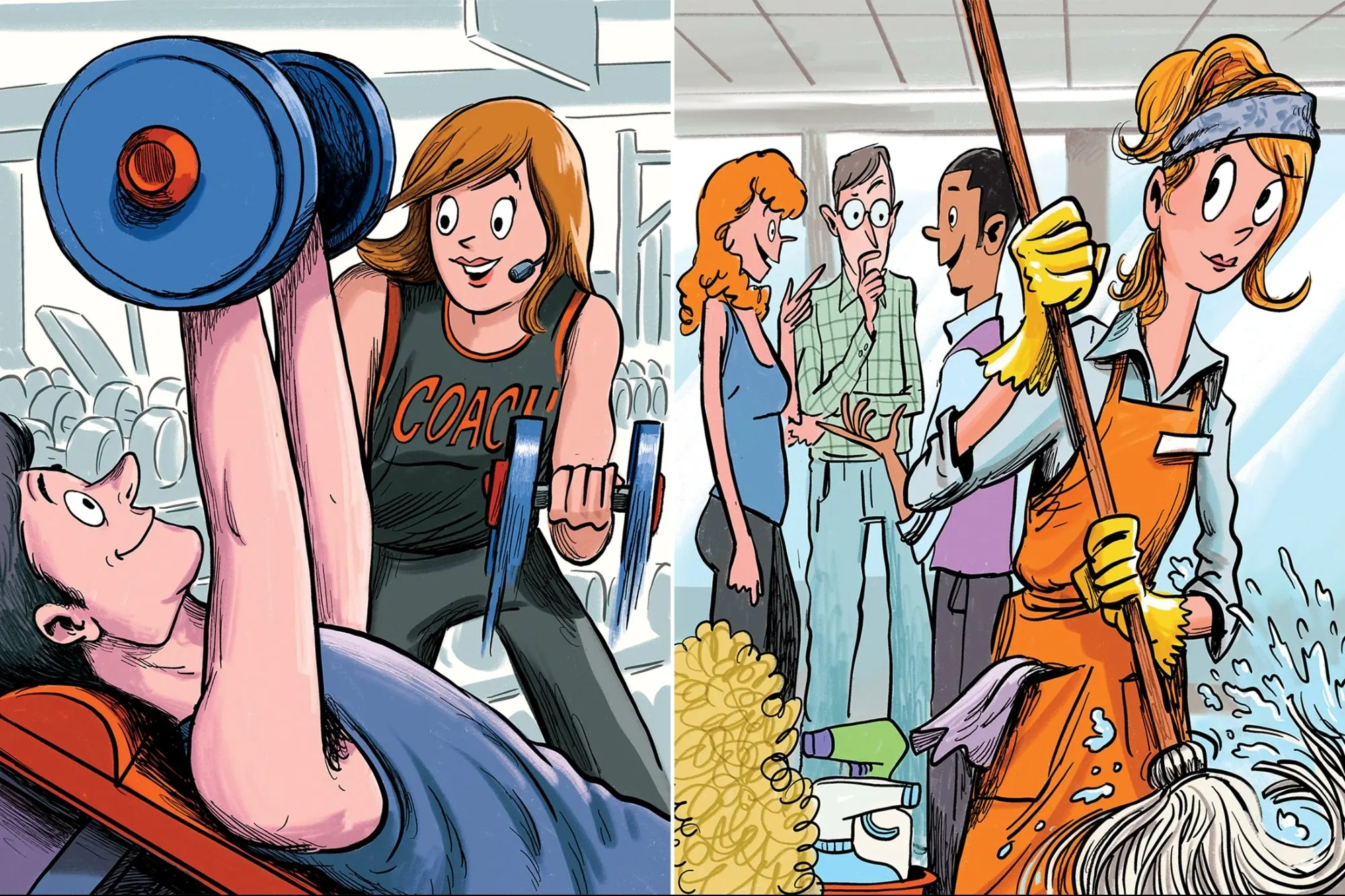
Erin Elgin, Colleen O’Ferrall-Jones, R.L. Hunnicutt II, and Claudia Martinez Azzara live in entirely different parts of the country. They own franchises in wholly different industries. They come from completely different backgrounds, and they spend their days doing totally different things.
Yet they are all among the top performers and sales earners in their franchise brands, in part because they all possess two core traits. First, they have a work ethic that compels them to do anything and everything that needs to be done — including the grunt work that others may avoid. Then, they combine that industriousness with a real belief in what they do. Some call it “leading with heart.” Others describe it as living a life of service rooted in faith. For all of them, their deep sense of purpose is based on building close relationships with their team and their clients.
This mix of work ethic and purpose has led these top performers to care about other human beings and to try to do not just the profitable thing, but also the best thing for everyone. Nobody, and no task, is beneath any of them.
Each of these people is in a different phase of their franchise experience, and they’re learning different lessons. But they all serve as role models for how living out certain fundamental values can help every franchisee rise to the top.
Related: 3 Traits You Need to Succeed as a Franchisor, According to Top Franchise Leaders
Want to become a leading franchisee yourself? We looked at four archetypes of top performers: The Listener, The Coach, The Person of Service, and The Happy Customer. Which are you?
Top Performer type #1: The Listener
Listen closely to your customer, and build what they want.
Erin Elgin never imagined, during her days as a CPA, that her path to prosperity would begin with a job as a janitor.
But that was the role her business partner, U.S. Army veteran Patrick Elgin, offered her when she decided it was time for a change. He had opened two Sola Salons in Minnesota’s Twin Cities, providing independent suites for beauty professionals. Erin didn’t know anything about the beauty industry, but she needed something other than 100-hour workweeks. And Patrick, looking at two additional locations, needed a new employee.
“I would go every day to vacuum and clean the bathrooms,” Erin says. “My whole family thought I was crazy.”
The funny little thing that Erin learned, though, is that beauty professionals will chitchat with the gal who is vacuuming — and once they started talking about their needs, plans, and dreams, Erin could figure out all kinds of ways to make them happy, keep them renting the spaces, and grow everybody’s businesses.
Today, they own 14 Sola Salons and are preparing to open the brand’s biggest-ever location later this year, with 101 studios compared to the average 45. The space will have a fitness center with showers, so clients don’t have to leave for a daily workout; a beauty supply store, so they don’t have to shop for products elsewhere; a podcast and content creation studio where they can promote their services; a yoga studio; an outdoor picnic area; an event space for classes; and a mini-mart with snacks — everything a beauty professional could possibly want.
For Erin and Patrick, getting to know the clients isn’t a gimmick; it’s heartfelt in a way that people can feel. “They’ve been really leaning in on taking a genuine interest in their salon pros and nurturing their needs and responding when there are maintenance issues at the site,” says John Pantera, vice president of franchise development at Radiance Holdings, the parent company of Sola Salons. “You can’t teach people to care. If you care and you take pride in your salon suites and get to know your salon pros, they will stay and continue to run great businesses.”
It’s important, though, to balance how much you care about the people around you with putting everyone in positions in which they — and the business — can actually succeed, explains Erin. “Our first mistake was hiring friends. Just don’t do it,” she says. “And then we would try to force people to fit in a role they weren’t a fit for, or we would change a role for a person because they weren’t the right fit. That was a mistake. When you’re creating roles for your organization, it’s serving the company’s needs and your needs as an owner. If a person isn’t the right fit, that’s OK. Wait for the person who is the right fit.”
Today, they have 660 professionals working out of their 14 sites, plus 11 employees on their support staff. “That’s a lot of people that are counting on them,” Pantera says, “but I think when you build it without having anything handed to you, and you’re not scared to get your hands dirty, the people around you see that you’re in the trenches with them.”
Related: 10 Traits of the Most Successful Franchise Owners
Top Performer Type #2: The Coach
Learn people’s goals, then help them achieve them.
Colleen O’Ferrall-Jones was working in real estate while raising three kids. As her 40th birthday approached, she decided it was time for something new. She pivoted to chase her dream of working in fitness — with her middle-aged body and all.
“At the time, I didn’t look like a personal trainer looks,” O’Ferrall-Jones says. “I even had a friend say, ‘Don’t you have to look like a personal trainer to be one?’ It stung, but she said it with love, and it became a fire lit under me.”
O’Ferrall-Jones started her own personal-training business, then took a class at Orangetheory Fitness, which was looking for coaches. Soon enough, she became a franchisee, eager to tap into Orangetheory’s existing branding and other franchise services. Nine years later, after becoming a coach, she owns two locations in California and Hawaii, and was just named an International Franchise Association “Franchisee of the Year.”
But even as she began leading franchises, O’Ferrall-Jones never stopped coaching, and she believes that’s what sets her apart. “I’m in that room every day working our brand and delivering the experience and the customer service that we set out to deliver,” she says. “That’s a choice for me. There’s a lot of franchisees that are just running their businesses — and they do great things. But I think that if you are not highly engaged in your business, there’s only so far you can go. You’ll be relying on the metrics to perform for you. I prefer to be in the business, seeing, feeling, and hearing in the day-to-day.”
All that effort helps keep the repeat business coming, says Lauren Cody, brand president of Orangetheory. “With Colleen herself still coaching, she’s able to engage the coaches in her organization in a unique and powerful way, and her members too,” Cody says. “Both of her studios are in the top 10% of member utilization, meaning how many times members come a week to work out with us. That is a very large determinant of how long a member will stay with us.”
O’Ferrall-Jones says she’s still learning how certain approaches work better in some markets than others. “I have one studio on the mainland [continental United States], and one in Hawaii, and they require different lenses for management and experience,” she says. “On the mainland, they want everything fast. In Hawaii, they want a more personal touch. My marketing has to be different.” Some things, though, work no matter where an Orangetheory studio is — like being a perfectionist about cleaning and greeting returning clients by name when they walk through the door.
Knowing exactly who is walking in the door can be crucial to how they feel walking out. “When a member comes to Orangetheory, they may have specific goals. Maybe they saw the doctor and they’re scared, or maybe they’re just trying to feel better. Or perhaps they’re preparing for an event, a wedding, whatever it could be,” Cody says. “Understanding their motivations is something that is part of the job for good coaches. And it comes naturally to Colleen. It’s a deeper empathy of understanding what they’re trying to achieve and helping them get there in a way that works for them.”
Related: Most Franchises Fail to Scale — But The Ones That Do Succeed All Have These 3 Essential Qualities in Common.
Top Performer Type #3: The Person of Service
Inspire others by working alongside them.
A similar force helped carve the path that R.L. Hunnicutt II took to success in Oklahoma City with Lime Painting, whose clients include residential and commercial properties. Hunnicutt had an MBA and had spent 16 years in corporate America until, at age 44, he was laid off with a severance package from his director job at R.J. Reynolds Tobacco Company.
“I took that money and said, ‘I don’t ever want to feel like this again,’” he recalls. When a franchise consultant called him to discuss options that might work, he looked at numerous franchises before choosing the paint industry. “Everything has a top coat on it, from houses to metal to gutters. It’s so many things.” Hunnicutt saw an opportunity he could pursue, and so he began dipping brushes into paint cans.
Being on the jobsites, he says, taught him about a whole lot more than how to be a better painter. It showed him how to better relate to his employees and clients.
“As the leader of the organization, everyone you bring in to work with you, they need to see that you care as much as they do,” Hunnicutt says. “You have to put your laptop down and get your hands dirty. It’s going to help you hire better people. It’s going to help you understand the consumer. It’s going to help you understand the market so you don’t outprice yourself. You have to get in and get involved.”
Hunnicutt recently received Lime Painting’s Rainmaker Award for generating the most companywide sales. He credits this success largely to leading with his heart and his faith.
He remembers an important moment from 2021. “I joined the Oklahoma City Black Chamber of Commerce here in the city, and they awarded me ‘New Business of the Year’ for my sales in my first year,” he says.
“I invited my pastor and my wife as my guests, and then my pastor invited me to the church to stand in front of the congregation to tell them about my award and my business. Well, one of the people at the church had a project he wanted to bring me onto, and then they gave me several multimillion-dollar contracts because of my relationships at church and me being a minority business enterprise.”
The buildings from those contracts are filled with apartments — sometimes as many as 700 — and a lot of them are affordable housing units.
“I love that lane. It’s where you meet the people in our society that other people have forgotten,” he says. “A lot of them are immigrants. Or they have kids, but their mental health is maybe impacting their ability to earn income, or maybe they fell on some bad times. I love going into those areas. You get a chance to beautify the area that they’re in. And everybody deserves something nice. They deserve a freshly painted wall, a new door, new appliances. We are able to get right in front of these people.”
Lime Painting CEO Nick Lopez says Hunnicutt’s mission is about “making a difference, not just about what he has to offer. People have taken notice and gained the interest and trust to follow.”
Today, Hunnicutt is considering expanding his painting business by adding a construction element — and he’s working on the blessing and curse that comes with being hands-on. Yes, it’s helping his business grow, but with four kids, he’s also trying to find some balance by letting others take on some of the burden. “You can feel like you don’t trust people — that nothing can be done unless you do it,” he says. “I have to practice what I preach a little better.”
Related: Buying a Franchise? Don’t Be Intimidated — Follow This Guide to Sizing Up a Franchisor.
Top Performer Trait #4: The Happy Customer
Transform from customer to business owner.
Claudia Martinez Azzara left her native Venezuela at age 16, after winning an academic scholarship. She ended up working at an international bank in Milan, Italy. The bank sent her for associate training to New York City, where she met her future husband. Eventually, she immigrated to the United States and continued to work in finance.
After 9/11, though, she lost her passion for the industry. “I was staying by the [Twin] Towers, so we saw it all,” she says. “I had to take my shoes off and run on the highway. I had to leave my belongings at the hotel, go and get a new passport. Those are important moments, and you make important decisions.” One of those big decisions was that it was time to quit the bank.
She ignored all the advice that her bosses offered and instead started selling beauty products online. After having kids, she discovered the paint-your-own-pottery business Color Me Mine as a customer. She loved the way she and her daughter felt as they worked together, simply painting pottery. She decided to become a franchisee and opened her first store on Manhattan’s Upper West Side in 2019. In calendar year 2024, she was Color Me Mine’s top-grossing franchisee.
“I love the purpose of it,” she says. “I really, really love seeing my customers happy. The brand has a soul. Most of the time, it’s about getting away from life and doing something meaningful, either by yourself or with somebody you love. What I saw with my daughter, it was really important. I was a young mom. What really mattered was my conversations with her. The bonding.”
That is the real value she is bringing to the world, Martinez Azzara says — not the ceramics, but the relationship-building that happens when parents and kids paint together. They actually put down their electronic devices and talk to one another while doing something creative.
“The joy is possible. The happiness is possible,” she says. “We have a lot of fathers coming too. It’s really hard for men to connect with kids outside of sports. This is something else.”
Color Me Mine CEO Teresa Johnson describes Martinez Azzara as possessing the rare combination of heart and hustle. “I think people have one or the other, but not always both,” Johnson says. “She really cares about her team and has an incredible work ethic. That ability to outwork other people is the big differentiating factor. If you have that, you can win.” And, Johnson adds, “She never asks somebody to do something that she hasn’t done or wouldn’t do. She works hand-in-hand in that store with her team. She’s not full time there, but you have to have that respect.”
Though there’s one more key trait, Johnson says: Martinez Azzara still participates in every possible opportunity to improve. “I know how easy it is to get in that mode that [you think] you’ve learned everything you need to learn — why do you need to go to the next meeting?” Johnson explains. “When a top performer is showing up for training, they don’t think they know it all.”
Martinez Azzara is also looking to expand. It’s another big life decision, which can be scary. But she has been using a trick for creating confidence. “Moving through your due diligence and knowing your values and seeing if you find a good match, that will help with the fear,” she says. “I start every sentence with, ‘I would like…’ That’s how you find a good match.



